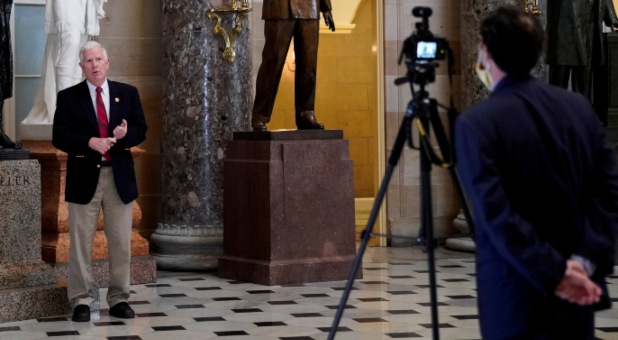CN Morning Rundown: Rep. Brooks Will Contest Electoral College Jan. 6
Here’s a quick summary of the top stories on cn.mycharisma.com.
No Concession: Rep. Brooks Will Contest Electoral College Jan. 6
Rep. Mo Brooks, R-Ala., is looking beyond lawsuits and media reports. During an interview on FBN’s Lou Dobbs Tonight, he vowed to challenge the Electoral College, a common political practice used as recently as 2017 by Democrats after President Donald J. Trump was elected.
“Well, it’s happened many times in the past,” Brooks said during the interview. “Apparently, some folks have not done their history.”
Brooks cites how Democrats in the House attempted it in 2017 when they tried to strike Alabama’s and Georgia’s votes for President Trump. In another example, Barbara Boxer tried to strike Ohio for George Bush in 2005.
“The law is very clear, the House of Representatives, in combination with the United States Senate, has the lawful authority to accept or reject Electoral College vote submissions from states that have such flawed election systems that they’re not worthy of our trust,” Brooks said.
“I’m quite confident that if we only counted lawful votes cast by eligible American citizens, Donald Trump won the Electoral College, and we should not be counting illegal votes and putting in an illegitimate president of the United States.” he added.
While much of the nation and mainstream media has proclaimed Joe Biden the winner of the 2020 election, Brooks represents a contingency of Americans determined to fight for the democratic process, which they believe was circumvented by voter fraud.
President Trump to Sue Multiple States on Strong Legal Merits
On Friday, the Supreme Court issued a short dismissal of the Texas election case against Georgia, Michigan, Pennsylvania and Wisconsin.
“The State of Texas’s motion for leave to file a bill of complaint is denied for lack of standing under Article III of the Constitution. Texas has not demonstrated a judicially cognizable interest in the manner in which another State conducts its elections. All other pending motions are dismissed as moot.”
The media proclaimed this ended President Donald J. Trump’s challenge.
It did not.
Court of Appeals Delivers Major Blow to Planned Parenthood
In a critical blow to Planned Parenthood’s access to taxpayer funds, the full United States Court of Appeals for the 5th Circuit held that the states of Texas, Louisiana and Mississippi could disqualify Planned Parenthood as a medical services provider under Medicaid. This effectively defunds Planned Parenthood from Medicaid dollars in those states.
In Planned Parenthood of Greater Texas Family Planning and Preventative Health Services Inc. v. Kauffman, the litigation began after the Texas Health and Human Services Commission learned of undercover footage obtained by the Center for Medical Progress—and verified by two forensic reviews—indicating that the abortion organization had broken federal law by profiting from the sale of fetal body parts from aborted babies that were then sold for research. The state removed Planned Parenthood’s Medicaid funding and several of Planned Parenthood’s patients immediately sued in federal court to challenge the decision.
By way of background, Planned Parenthood gains access to indigent women by providing birth control and preventive services under the Medicaid program. Medicaid payments constitute a significant chunk of the taxpayer funds flowing to the abortion giant. According to a Washington Post article published recently, “about half of Planned Parenthood’s patients are on Medicaid.” As a Medicaid provider, Planned Parenthood milks Medicaid patients like they are “mini cash cows,” according to former Planned Parenthood manager Ramona Treviño.
Contrary to what the Washington Post implied, however, efforts to cut off the flow of Medicaid funding to Planned Parenthood historically have failed in the courts, not in the politically accountable branches of government. Five federal appellate courts have read the Medicaid statute as barring states from disqualifying Planned Parenthood as a Medicaid provider. As we have argued, see here and here, however, the Medicaid statute says no such thing. {eoa}




























































